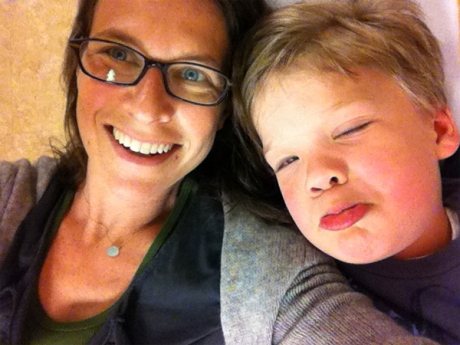Facebook helps diagnose Kawasaki disease, saving 4-year-old boy's life

On Mother's Day morning, Deborah Copaken Kogan's 4-year-old son Leo woke up with a rash. Since a recent note from Leo's day care reported a case of strep in his classroom, Deborah felt his forehead, noted it was hot, and took him for a strep test. That's how a long saga involving Facebook unfolded, as told in full on Slate.
While waiting for the test, she snapped a photo of her son on the examination table and posted it to Facebook with the following caption: "Nothing says Happy Mother's Day quite like a Sunday morning at the pediatrician's." The test came back negative, but the doctor decided to treat Leo for strep while waiting for his throat culture results. Back on Facebook, many friends commented on the photo asking what was wrong. Deborah wrote "Strep, no biggie." She then filled the prescription at the nearest pharmacy and fed Leo his first dose.
The next morning, Leo was worse. The family doctor concluded it was scarlet fever (a fancy name for strep with a rash), also pending the results of the throat culture. Deborah posted another photo on Facebook with the following less cheeky caption: "Baby getting sicker. Eyes swollen shut. Fever rising. Penicillin not working. Might be scarlet fever. Or roseola. Or...???? Sigh."
Within three hours, 20 concerned comments had appeared underneath the photo. The next morning, Leo's face was swollen beyond recognition. Deborah took a dozen photos of Leo from various angles to send to the family doctor via MMS, and posted the least frightening ones on Facebook. "Swelling worse," she wrote, "especially eyes and chin. Fever still crazy high. Poor baby."
Ten minutes later, Deborah received a call from her Facebook friend Stephanie, a film actress and former neighbor. "I hope you'll excuse me for butting in but you have to get to the hospital," she said. "Now. The longer you wait, the worse the damage." Her son Max had had the exact same symptoms, and was hospitalized for Kawasaki disease. Deborah looked it up online and found it was a rare and sometimes fatal auto-immune disorder that attacks the coronary arteries surrounding the heart. Many of Leo's symptoms seemed to match the descriptions, though there were also similar ones to the flu and scarlet fever.
Then Leo's strep test came back negative. The most recent Facebook photo had garnered 36 comments, with various diagnoses and words of support, and Deborah's inbox had multiple private messages. One was from her friend Beth, a pediatrician, and it echoed Stephanie's fears. Deborah's cousin Emily, a pediatric cardiologist who often has to deal with the fallout from untreated Kawasaki, also called after seeing the photo, urging her to go to the hospital. "The damage begins as early as five days after the onset of symptoms," she said.
Three Facebook friends were enough for Deborah to take Leo to the hospital. From the hallway in triage, she finally called her family doctor and filled him in. "You know what? I was actually just thinking it could be Kawasaki disease," he said. "Makes total sense. Bravo, Facebook."
Over the next three weeks, Leo was treated, released, retreated, and rereleased for Kawasaki disease and then the Kawasaki-triggered liver disease. After helping diagnose Leo, Facebook then played the role of keeping family and friends in the loop about his condition. Deborah explained the social network helped her "to feel connected—profoundly connected—to the human race while living, breathing, eating and sleeping in the isolating, fluorescent-lit bubble of a children's hospital ward, where any potential humans I might have 'friended' on our floor were too distraught over the fates of their own children to make any room in their hearts for strangers."
Two months later, Leo's liver is slowly recovering. While his enlarged heart is doing well, he will have to endure echocardiograms every year for the rest of his life.
See also:
